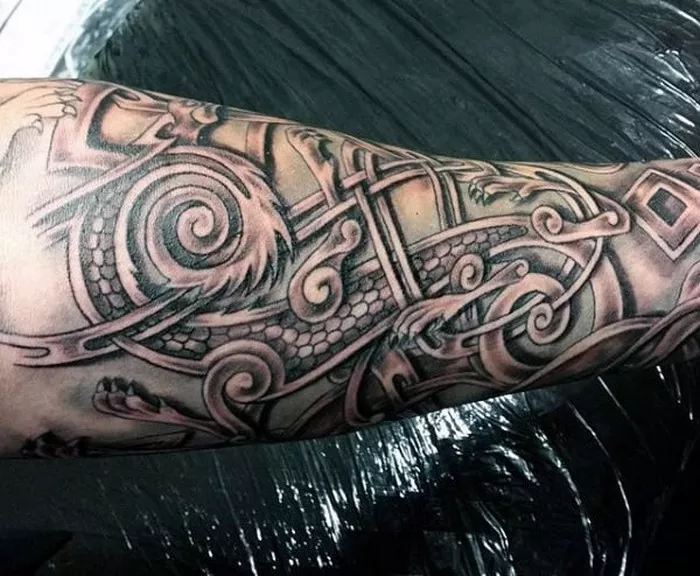Celtic tattoos have surged in popularity over the years, captivating individuals with their intricate designs and rich symbolism. As people contemplate getting inked with these mesmerizing patterns, a common question arises: are Celtic tattoos truly Irish? Delving into the history, symbolism, and cultural significance of Celtic tattoos unveils a complex narrative that intertwines with Irish heritage while transcending geographical boundaries.
Exploring Celtic Origins: Beyond Ireland
The term “Celtic” encompasses a broad cultural and linguistic group that originated in Central Europe around 1200 BCE. These ancient Celts spread across vast regions, including modern-day Ireland, Scotland, Wales, England, France, and parts of Spain. The intricate knotwork, spirals, and interlacing patterns associated with Celtic artistry emerged from this diverse cultural milieu.
While Ireland holds a prominent place in Celtic heritage, it’s essential to recognize that Celtic culture extends far beyond its shores. The interconnectedness of Celtic tribes facilitated the exchange of artistic motifs and cultural practices across Europe. Therefore, attributing Celtic tattoos solely to Ireland would be oversimplifying their origins and significance.
The Evolution of Celtic Tattoos
Celtic tattoos have a rich and evolving history that reflects the dynamic nature of Celtic culture. The earliest evidence of Celtic tattooing dates back to the Iron Age, where archaeological findings reveal intricate designs adorning the bodies of ancient Celts. These tattoos likely held symbolic significance, representing concepts such as bravery, spirituality, or tribal affiliation.
As Celtic culture evolved over time, so did the art of tattooing. With the spread of Christianity in the early medieval period, Celtic motifs became intertwined with Christian iconography, giving rise to unique designs such as the Celtic cross. Despite external influences, Celtic symbolism remained deeply rooted in pagan traditions, blending ancient beliefs with Christian symbolism.
The resurgence of interest in Celtic art during the Celtic Revival of the 19th and 20th centuries further fueled the popularity of Celtic tattoos. Artists and scholars sought to preserve and revitalize Celtic heritage, inspiring a renewed appreciation for Celtic symbolism in various art forms, including tattoos.
Decoding Celtic Symbolism
At the heart of Celtic tattoos lies a rich tapestry of symbolism, each motif carrying its own unique meaning. While some symbols are universal, others hold specific significance within Celtic culture. Understanding the symbolism behind these motifs adds depth and meaning to Celtic-inspired tattoos.
1. Trinity Knot: Also known as the Triquetra, the Trinity Knot symbolizes the interconnectedness of mind, body, and spirit. It is often associated with concepts of eternity, unity, and the cycles of life.
2. Spirals: Spirals are one of the oldest and most widespread motifs in Celtic art. They represent the journey of life, with each curve symbolizing growth, transformation, and the eternal cycle of renewal.
3. Claddagh: The Claddagh is a traditional Irish symbol consisting of two hands holding a heart topped with a crown. It symbolizes love, loyalty, and friendship, making it a popular choice for tattoos commemorating relationships and commitments.
4. Tree of Life: The Tree of Life symbolizes the interconnectedness of all living beings and the cyclical nature of existence. Its roots delve deep into the earth, while its branches reach towards the heavens, bridging the gap between the physical and spiritual realms.
5. Animals: Celtic mythology is replete with stories of animals imbued with symbolic meaning. The Celtic wolf represents guardianship and loyalty, while the Celtic stag embodies strength, independence, and regrowth.
While these symbols are deeply ingrained in Celtic heritage, their meanings can vary based on personal interpretation and cultural context. For individuals considering a Celtic tattoo, delving into the symbolism behind each motif can help them choose a design that resonates with their own values and beliefs.
The Cultural Significance of Celtic Tattoos
Beyond their aesthetic appeal, Celtic tattoos carry profound cultural significance for those of Celtic descent and enthusiasts alike. For individuals with Celtic ancestry, these tattoos serve as a tangible connection to their heritage, honoring the traditions and values passed down through generations.
Moreover, Celtic tattoos have transcended geographical and cultural boundaries, appealing to people from diverse backgrounds who are drawn to the timeless beauty and symbolism of Celtic art. In an increasingly globalized world, Celtic tattoos serve as a testament to the enduring allure of ancient traditions and the universal human desire to connect with our roots.
Conclusion
In conclusion, the question of whether Celtic tattoos are Irish is both complex and multifaceted. While Ireland undoubtedly holds acentral place in Celtic heritage, Celtic culture extends far beyond its borders, encompassing diverse regions and peoples across Europe. Celtic tattoos, with their intricate designs and rich symbolism, serve as a tangible expression of this cultural heritage, resonating with individuals of Celtic descent and enthusiasts worldwide.
As the popularity of Celtic tattoos continues to grow, it is essential to recognize and celebrate the diverse origins and meanings behind these timeless symbols. Whether adorned with trinity knots, spirals, or Claddagh rings, Celtic tattoos offer a window into the rich tapestry of Celtic culture, inviting us to explore and appreciate the enduring legacy of our ancestors.


